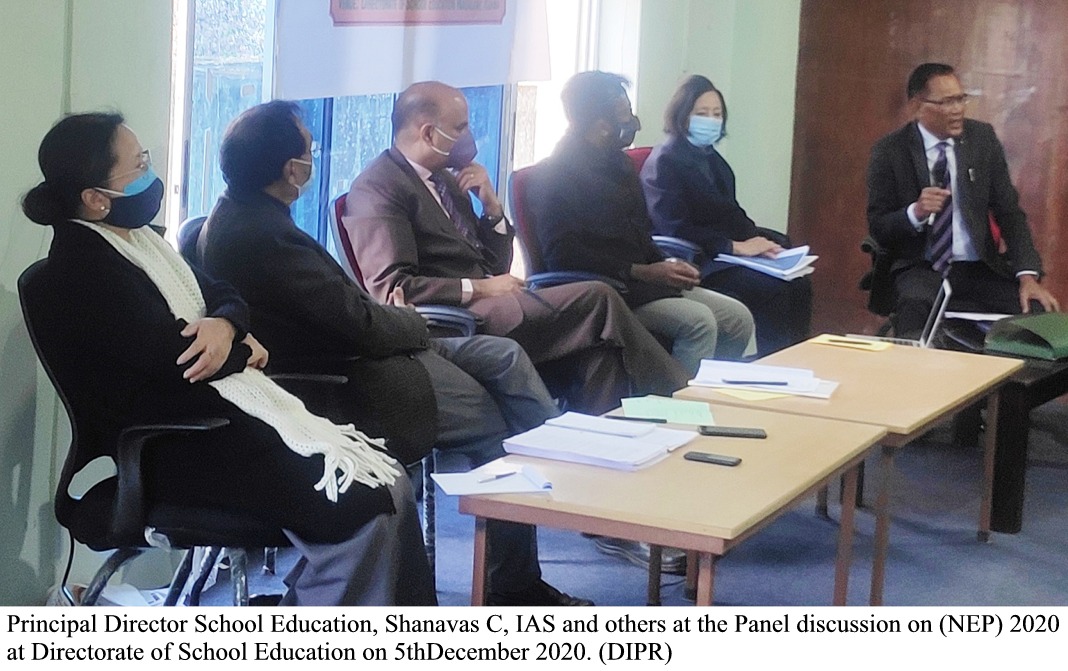Prof. Rakesh Rai added that Holistic & Multidisciplinary education will help students to learn and allows students with the flexibility to combine multi-disciplinary subjects along with the integration of vocational courses
 KRC TIMES Desk
KRC TIMES Desk

Panel Discussion on National Education Policy (NEP), 2020 organised by Nagaland Education Association in collaboration with the Directorate of School Education Nagaland Kohima at the Directorate of School Education Nagaland, Kohima was held on 5th December.
In the keynote address Dr Bweyhunle Khing Vice President, NEA mentioned that the panel discussion on NEP 2020 is important and essential for our state and is the right platform as it includes all the renowned, and professional educationists who are the torchbearers. She mentions that NEP 2020 drafted and approved by the Central Government, .was amended to bring changes for the entire structure of Indian Education system and to reform the structure of Educational policy.
She also highlighted some of the important objectives of NEP 2020, the main vision being to enable all the learners by providing high quality education and to explore and also to make our nation a global leadership in the field of economic growth, scientific advancement, cultural preservation, social justice, equality and learners to avail by giving opportunity to choose their own courses for students from school to university level and at the same time by giving due exposure to vocational Education too and also to recognise and identify the unique capabilities of each student’s and encourage them to have a holistic approach in both academic and non- academic sector. She appealed everyone to join hands together to make our educational system as one of the best providers of quality Education.
The panellist included Principal Director, School Education Shanavas C, former Director SCERT Vipralhou Kesisezie, Professor, Department of Education Nagaland University Prof. Buno Liegise, Advisor All Nagaland Private School Association Pheluopfelie Kesiezie, Professor and Head of the Department of Education Nagaland University Prof Rakesh Rai, Chairman NBSE, Asano Sekhose.
Principal Director School Education Shanavas C, said that the National Education Policy 2020 (NEP) is a comprehensive framework for elementary education to higher education as well as vocational training in both rural and urban India. The Policy envisages a new curricular and pedagogical structure for school education which is responsive and relevant to the needs and interests of learners at different stages of their development. This Policy aims to shape an education system that benefits all. He said that one of the main focuses to be more on content and results which will now pave the way that aims to encourage cognition and creativity. With its multidisciplinary approach, students will have the opportunities to innovate and adapt, allowing them to swiftly move between different interests and fields, enabling constant up-gradation of skills, thus restructuring the entire system to be more learner centred, based on the pillars of access, equity, quality, affordability, and accountability.
On the question raised by one of the participants on the Eligibility test for recruitment, Shanavas said that based on the new policy, Large Teacher Eligibility Tests will be strengthened, to include to reflect a score that will be taken into consideration during recruitment. A minimum of 50 hours of participation in such CPD is required in a year. Assessment and other methods will be put into measures the student learning and understanding Shanavas acknowledged that the panel discussion is to sort out how to implement the policy and to have more ideas whether it will suit in our state
Former Director SCERT Vipralhuo stated that the new education system is meant to build a future citizen to fit into the social, cultural, and economic processes of the nation. The main focus in the policy is on tracking performance based on learning outcomes. The tests will be on core concepts and knowledge, higher-order skills.NEP-2020 has envisioned making the examinations easier to test core capabilities and competencies. The policy will transform the assessment system by reorienting teachers. The boards of the future have to be different than the way they are functioning today, the focus should move from formative, rote learning to a system where skills and competencies the policy envisages assessment to undergo a transformation by emphasising continuous tracking of learning. He added that the National Testing Agency (NTA) will offer high-quality common aptitude tests and the self and peer assessment methods are a healthy sign which will help to reflect the progress and uniqueness of the learner’s cognitive.
Prof. Rakesh Rai added that Holistic & Multidisciplinary education will help students to learn and allows students with the flexibility to combine multi-disciplinary subjects along with the integration of vocational courses. The new element is that students will be given ‘multiple exit options’ & appropriate ‘certification’ will be given to them within their graduation tenure. He mentions that the Government is also taking steps towards the establishment of Multidisciplinary Education and Research Universities and a National Research Foundation is on the pipeline to be created for fostering research and other development activities.
Vote of thanks was delivered by Neizekhonuo Liezietsu Treasurer, NEA.


